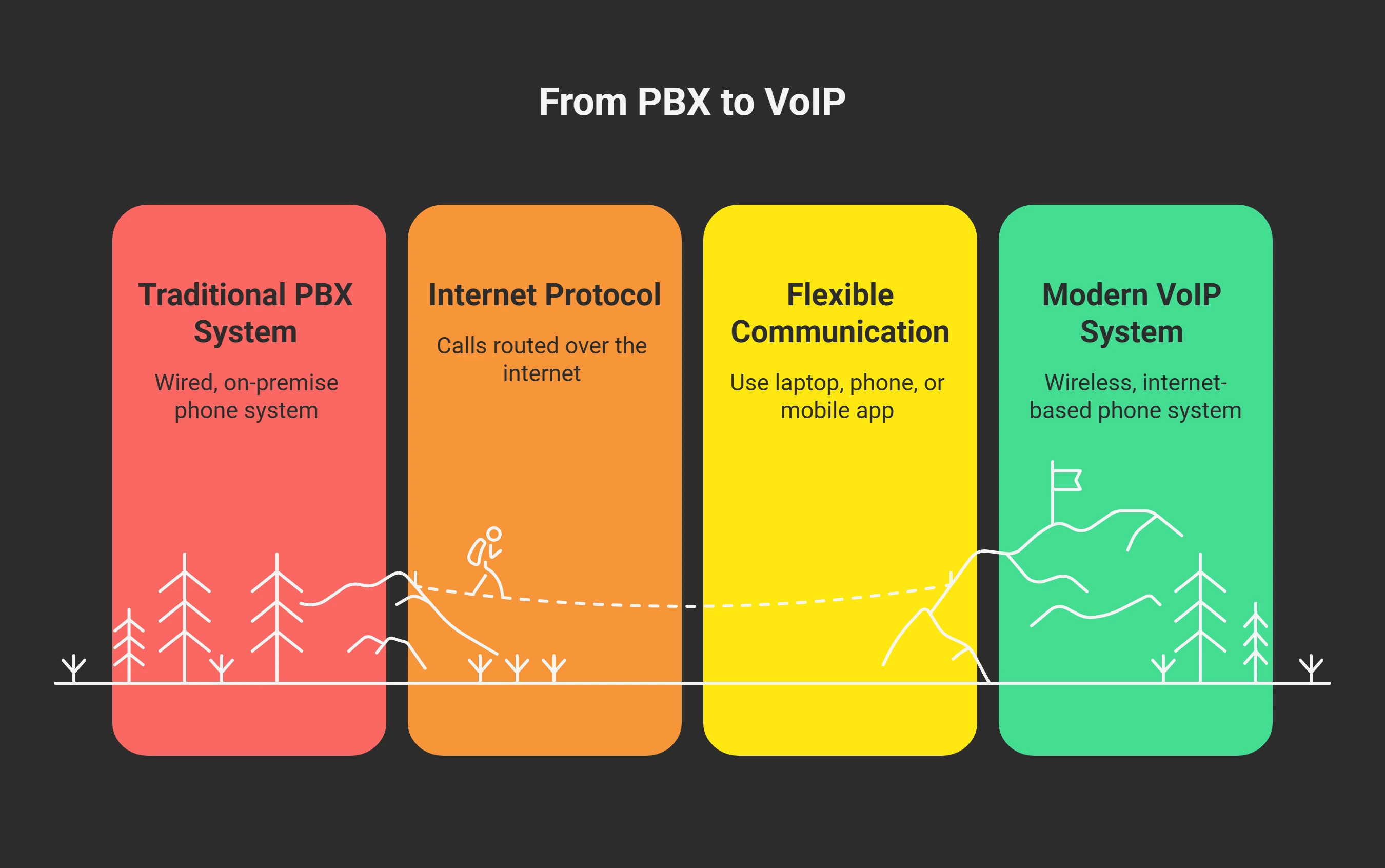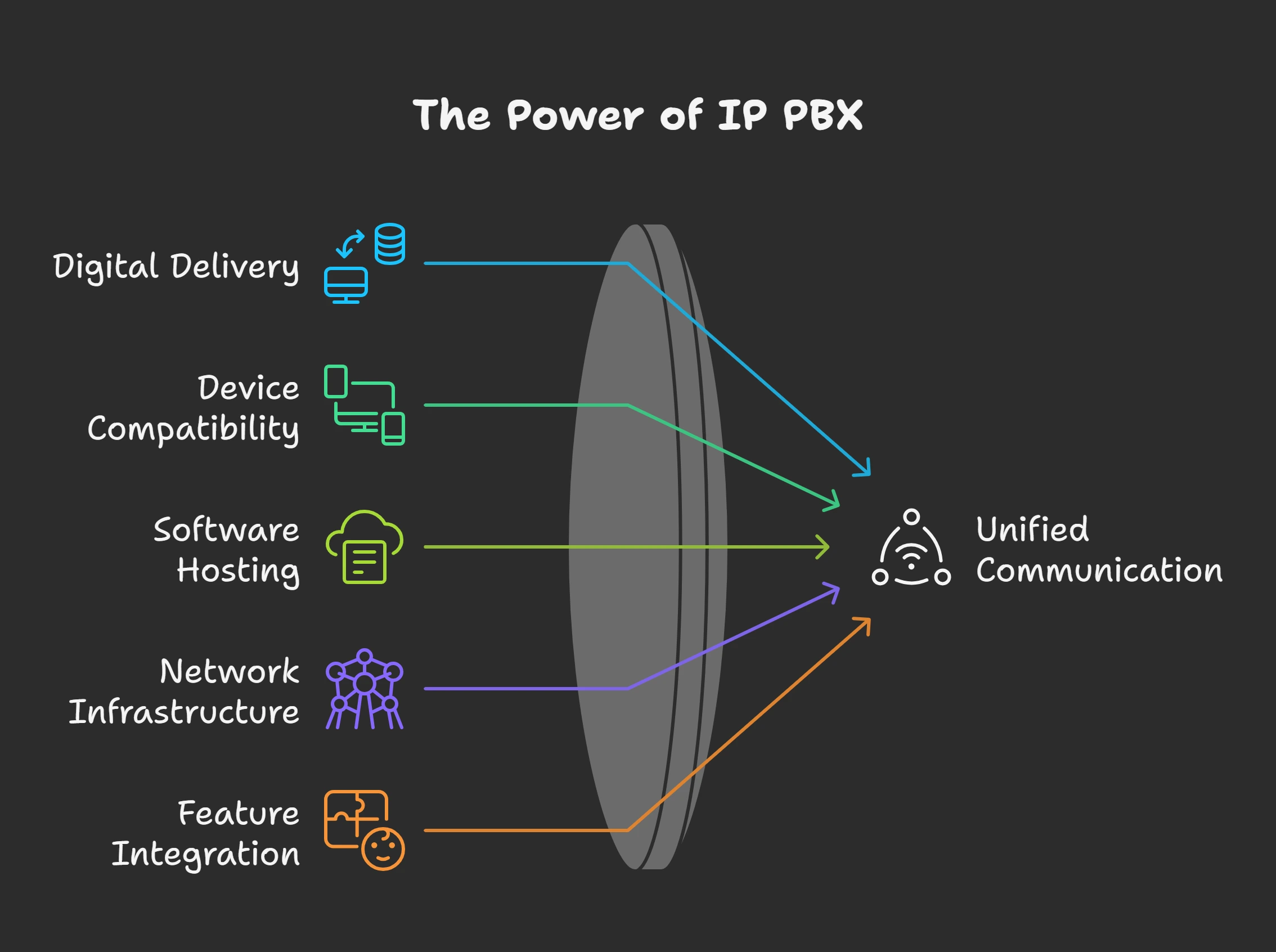
What is the difference between IP PBX and traditional PBX?
Summary:
This blog compares traditional PBX and IP PBX systems, explaining how each affects business communication. It breaks down the key differences between PBX and VoIP, outlines the benefits of IP PBX, like flexibility, scalability, and cost savings and explores why many businesses are moving toward managed, cloud-based solutions.
You’ll also learn:
- How traditional PBX systems work (and their limitations), What makes IP PBX a modern alternative, The role of VoIP in powering today’s communication, Key features like voicemail-to-email, mobile access, and CRM integration, When to upgrade, and how to switch smoothly, Real-world case study and common myths debunked.
.avif)
If your business is still working with a traditional PBX setup, you probably already know the tradeoffs. Sure, the sound quality is reliable, and the system feels familiar. But it’s not exactly built for how teams operate today, especially if you’ve got people working remotely or moving between locations.
Adding a new line? That usually means calling in a technician. Rearranging the office or growing your staff? That might require physical rewiring. Over time, those small headaches start to pile up. What used to be considered a robust system now feels like a rigid one.
On the other hand, more and more companies, especially newer ones, are adopting IP PBX systems. These run over your internet connection instead of traditional phone lines, and they’re designed for flexibility. You can add or remove users in just a few clicks, route calls from your laptop or mobile phone, and avoid the spaghetti mess of copper wiring altogether.
It’s not just about technology upgrades, it’s about giving your team the ability to work smarter, communicate more easily, and scale without technical barriers.
PBX vs VoIP – Here’s What You Actually Need to Know

Alright, let’s make this simple. You’re looking at phone systems and you keep seeing these two terms: PBX and VoIP. Everyone talks about them like you should already know what they mean, but most people don’t. So here’s the deal.
What is PBX?
PBX stands for Private Branch Exchange. It sounds fancy, but it’s really just your internal phone system. You know how you can call someone in your office by dialing an extension? That’s the PBX doing its thing.
In the old days (and still today for some companies), a PBX system was a box sitting somewhere in your office. Every phone in the building would connect to it through actual wires. And when you called out, the PBX would route the call through your phone provider.
If you needed to add a new extension or move someone to a different desk, you usually had to get IT or some phone tech to come in and change stuff. Kind of a pain, but it worked.
And VoIP?
VoIP means Voice over Internet Protocol. In plain English: it sends your phone calls over the internet instead of through those old-school copper lines. If you’ve ever made a call through Skype, Zoom, or even WhatsApp, that’s VoIP.
What’s cool is that VoIP doesn’t need all that physical wiring. You can make calls using a laptop, a VoIP phone, or even your mobile if you’ve got the right app.
So, How Does Traditional PBX Actually Work?
Let’s break it down real quick:
- It’s installed in your office
- Desk phones connect to it with wires
- Calls go out through standard phone lines
- Adding a new user or moving a phone? Gotta get someone to help
Why Do Some People Still Use It?
Some companies just like what they know. PBX systems are super reliable, they don’t depend on your internet connection, so call quality is usually solid. They’re secure and totally offline, which some businesses prefer.
But There Are Downsides
PBX systems can be expensive. The hardware, the installation, the ongoing maintenance, it all adds up. And if your business grows or goes remote, it’s not exactly easy to make changes.
You also miss out on modern features like voicemail to email, call recording, analytics, or anything that talks to your CRM.
What’s the Real Difference Between PBX and VoIP?
Easy:
- PBX is the phone system also manages call routing.
- VoIP is the way your calls travel, over the internet.
You can actually have both. Some companies use IP PBX, which is just a PBX system that uses VoIP instead of old lines. But a lot of companies are skipping the box altogether and going full cloud-based VoIP. No hardware, no headaches.
What Is IP PBX and How Does It Work?

An IP PBX offers the same call-management features (extensions, transfers, voicemail) but delivered digitally over your network using VoIP. Calls work from desk phones, mobile apps, laptops, virtually any device.
How It Functions
- Runs on software hosted locally or in the cloud
- Uses internet or network infrastructure instead of wiring
- Interfaces with phones, apps, or headsets
- Enables features like voicemail-to-email, softphone apps, and CRM integration
Can You Use IP PBX Without Technical Knowledge?
One of the biggest misconceptions about modern phone systems is that they’re complicated. The truth? You don’t need an IT degree to manage or use an IP PBX, especially if you choose a managed IP PBX provider.
Modern platforms are designed for non-technical users. Think drag-and-drop call flows, simple web dashboards, and plug-and-play devices. Adding a new user? That’s often as easy as typing an email and clicking “Activate.”
Even call forwarding, voicemail-to-email, or routing rules can be handled by office admins or team leads. No wires. No server rooms. No long vendor wait times.
So yes, you can absolutely run your business on a powerful IP PBX system, even if you’re not technical.
Benefits of IP PBX: Why Teams Are Switching
Moving to IP PBX unlocks powerful advantages:
- Lower Upfront Cost
You don’t need expensive switchboards or physical wiring, just reliable internet or a hosted server. - Effortless Scalability
Add or remove users instantly via a dashboard, no need for physical line changes. - Remote & Mobile Access
Staff can take calls from home, on their phones, or in another office seamlessly. - Advanced Features
Get voicemail transcripts, call analytics, custom routing, integrations, things traditional systems don’t support. - No Heavy Maintenance
Software updates and backups happen automatically, especially if hosted.
For many businesses, these benefits of IP PBX offer flexibility, cost savings, and performance improvements over legacy models.
Understanding Managed IP PBX
If you don’t have in-house IT expertise, managed IP PBX is an excellent option.
What It Entails
- A provider sets up, hosts, and maintains your phone system
- They guarantee uptime, manage upgrades, and offer support
- You pay a monthly fee and preserve flexibility without the complexity
Ideal For
- Small to mid-sized firms without internal IT
- Teams expanding remotely or across locations
- Organizations craving enterprise-level features minus technical headaches
Feature Comparison: Traditional PBX vs IP PBX
When Traditional PBX Still Makes Sense
- Internet connectivity is unreliable or expensive
- Staff never work remotely and never relocate offices
- You have large sunk costs in existing PBX setup
- Legal or compliance requires on-prem systems
Even in those scenarios, legacy systems may work, but they won’t offer agility.
Is Your Phone System Holding Back Business Growth?
If your business has grown in size, or complexity, but your phone system still looks like it did ten years ago, you’re not alone. Many small and mid-sized companies outgrow their traditional PBX setups without realizing it. That’s because legacy systems often work “well enough”, until they don’t.
Maybe you’ve run into issues like:
- Limited extensions that won’t scale with your team
- Trouble connecting remote or hybrid employees
- High maintenance costs and outdated hardware
These are subtle signs your communication tools are capping your potential. Switching to a flexible IP PBX system, especially a managed IP PBX, removes those limits. You get the ability to add users, connect remote agents, and adapt to new business models without waiting on a phone technician.
Your phone system shouldn’t be a bottleneck. It should support the pace and scale of your success.
When It’s Time to Switch to IP PBX
You should strongly consider IP PBX if:
- You’re working with remote or hybrid teams
- You’re adding offices, moving locations, or growing fast
- You need call analytics, mobile app calling, or CRM syncing
- You want to lower recurring costs on phone lines or hardware
The real value shows up the moment flexibility becomes a need, not a luxury.
Five Steps to Transition Smoothly
- Audit Your Current System
Document existing lines, extensions, call flows, and pain points. - Evaluate Providers
Look for low-cost trials, call quality testing, and uptime guarantees if considering managed IP PBX. - Pilot Test a Group
Try it with one team first. Get feedback, monitor call quality, and confirm feature use. - Training & Onboarding
Show staff basic functionality, mobile app calling, voicemail review, routing, etc. - Port Your Numbers & Go Live
Most vendors assist with number porting, so calls continue without interruption.
Case Study: A Small Agency’s Transition
A boutique marketing agency with three offices used traditional PBX for years. Whenever someone made a natural disaster cleanup call or routing error, it was a hustle to update extensions and forward office lines.
Once they switched to a managed IP PBX, their staff could answer business calls on their phones from anywhere. Voicemails were routed to email, team collaboration improved, and their phone bill dropped by 30%. No more extension changes, just instant provisioning and no physical interference required.
That’s the power of stepping into the digital era.
Additional Heading: Common Misconceptions About IP PBX
- "VoIP call quality is worse." Not necessarily. With a stable internet, quality is excellent. Managed providers also offer compression and failover to improve reliability.
- "Migrating will be disruptive." Planning and pilot testing minimize downtime. Number porting ensures callers experience no interruption.
- "Remote staff will lose calls." In fact, many systems allow simultaneous calls to desks, apps, and mobile.
- "Security gets worse." Reputable vendors use encryption and firewall protection, which can be more secure than analog lines.
Conclusion
So here’s the deal, both PBX and VoIP have their place, but they’re made for totally different kinds of businesses. If you’ve got an office-based setup that barely changes, and you’re not too worried about modern features or remote access, a traditional PBX might still hold up just fine.
But if you’re like most companies today, scaling, running a hybrid team, or just trying to keep things simple and cost-effective, VoIP is probably the better move. It’s easier to set up, easier to manage, and gives you way more flexibility without all the tech headaches.
And hey, if your team is making a lot of outbound calls, don’t waste time dialing manually. Tools like PowerDialer.ai can help your reps move fast.
FAQ Section
Q: What is the difference between PBX and VoIP?
PBX manages call routing; VoIP is the method of sending audio. IP PBX combines both via internet-based calling.
Q: What is managed IP PBX?
It’s a hosted phone system supported by a vendor, covering installation, system health, updates, security, and uptime.
Q: What are the benefits of IP PBX?
Lower costs, fast scaling, remote/mobile support, powerful features, and minimal maintenance.
Q: Can I keep my current phone numbers?
Yes. Most providers offer porting so your team keeps the same phone numbers.
Q: Is IP PBX suitable for small businesses?
Yes! It’s especially beneficial if you don’t have an IT team and want flexible, professional calling tools.
